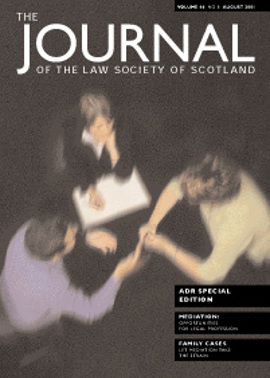Learning from across the Atlantic
Angus solicitor Susie Clark has developed a practice which places mediation at its core.
Her desire to learn more about what makes a good mediator led her recently to Allentown in Pennsylvania where she met with Judge Edward Cahn, former Chief Judge of Pennsylvania and a man of such local renown that the town’s new courthouse is set to be named in his honour.
“I made contact with Judge Cahn by e-mail in my bid to seek out a real, live American mediator from whom I could learn a little of American practice.”
Judge Cahn’s own mediation practice came about when as a judge he had always been conscious of the unmitigated expense litigation creates for all parties, preferring to adopt a pro-active role with parties to litigation, often assisting in the resolution of disputes in chambers rather than from the bench.
“The process of mediation described by Edward Cahn is quite different from that which I have experienced under the auspices of CALM”, said Susie Clark.
“Under the CALM umbrella, parties are brought into the mediation process fully aware of the confidentiality of the procedure and reassured that the role of the mediator is entirely independent. Both parties are advised not to communicate privately with the mediator and the mediation process itself takes place in plenary sessions. Edward Cahn described similar confidentiality but designed his role as something more akin to that of facilitator than mediator.
“He always ensured that he was well briefed on the details of the dispute and brought parties to a common meetinghouse in the first instance but not housed within the same meeting rooms. Breakfast, coffee and other facilities are provided with a view to encouraging a relaxed atmosphere and, when the mood is right, Edward Cahn begins to shuffle between the meeting rooms clarifying the positions of both parties. He enjoys a full understanding from each party and takes on board any editing each party wishes to impose when presenting their position to the other.”
Susie Clark diverges from Cahn when describing his view that “the art of mediation was essentially a gift”.
“In my experience mediators are trained rather than just utilising a natural gift. Training allows for performance to be assessed rationally. Multiple layers of skills are required to mediate successfully. The training I have received from CALM provides an excellent training base, the sessions keeping you focused on your strengths and weaknesses. There may be some element of a natural predisposition to mediation. Certainly I’ve always found it more rewarding to achieve a settlement by mediating rather than litigating.”
She rejects any notion that mediation is somehow alien to the solicitor’s traditional role.
“The old-fashioned notion that a solicitor would be more of a general agent acting in the best interests of the client would, I think, have seen them acting naturally as mediators.
“There are situations where it is inappropriate, but it’s important not to see the client’s problem in a vacuum and not just offer cold black letter law advice.”
While America is often regarded as a highly litigious society, Susie Clark’s impression is of a system which is more “future focused”.
“The issue there is not who is right and who is wrong but rather ‘how can I move forward from here, maximising circumstances for me’.
“ Falkirk seems progressive in adopting pro-mediation policies but other sheriff courts and solicitors are not pro-active in fostering mediation as a solution.
“Mediation can be used either as a first or last port of call where there is no other means of overcoming an impasse. Just getting clients to talk precipitates some change in their position. Mediation is an environment where people learn how to communicate and look at the other point of view.
“Where a couple are separating or divorcing, whatever the substantive reasons, it will also be as a result of a breakdown in communication, and there is a need to re-establish a means of communication.
“Some use mediation as a stepping stone whereas for others it will resolve issues and they can then go back to not speaking!”
Her experience is that some solicitors in this country still don’t really know what mediation is. She would reassure the profession that mediation won’t threaten profits.
“Solicitors are subconsciously mediators. The introduction of strict conflict of interest rules has probably inhibited lawyers’ natural inclination to act as a mediator.
“In many ways it’s easier for solicitors to opt for an aggressive court room battle but we only ever have a 50% chance of success and a defeated client is unlikely to come back. In my experience, both parties feel positive after successful
mediation. These clients are more likely to have a favourable impression of the service their solicitor can offer and come back with more business. The best marketing is success together with word of mouth.
“Edward Cahn was a huge inspiration. He suggested that mediation will become a more readily recognised service with the general public. I hope that will be true and that the service will be seen as one that solicitors do well.”






